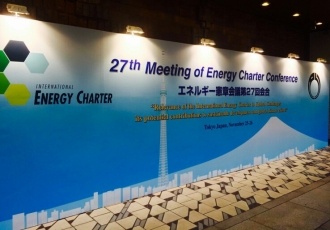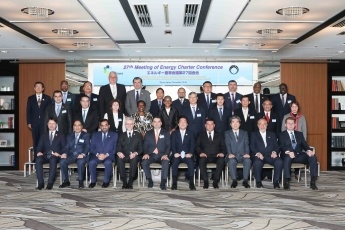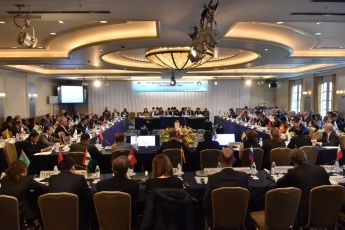Press Releases
27th Meeting of the Energy Charter Conference (Ministerial Session)



1. On November 25 and 26, Japan hosted the 27th Meeting of the Energy Charter Conference in Tokyo as the chair, for the first time in East Asia. Representatives from 69 countries and regions, including 32 Ministerial-level participants, among them Ministers from Georgia, Afghanistan, Iran, Jordan, Romania, Slovakia, Swaziland, Uganda, and 9 international institutions attended the meeting.
2. Following a welcome reception hosted by Mr. Fumio Kishida, Minister for Foreign Affairs and the experts’ meeting, on November 25, the Ministerial Session on November 26 was attended by Mr. Kentaro Sonoura, State Minister for Foreign Affairs, as the head of Japanese delegation, and as the acting chair of the Energy Charter Conference. At the Welcome and Opening Session, State Minister Sonoura delivered remarks on the transformation of global energy landscape and addressed issues that the international community is facing in the energy field including the energy transition, as well as the importance of energy investments, the effectiveness of the Energy Charter Treaty (ECT) in promoting investments, and its significance and importance for Asia (Opening Remarks (English (PDF) / Japanese (PDF)
/ Japanese (PDF) ) ).
) ).
3. At the Ministerial Session, participants engaged in a lively discussion on possible contributions by the ECT to address climate change and sustainable development, including energy access, as well as the potential role and possibilities of the Energy Charter in dealing with major global energy issues from the viewpoint of Asian emerging countries and African countries.
4. The “Tokyo Declaration on the Energy Charter (English (PDF) / Japanese (PDF)
/ Japanese (PDF) )” was issued as an outcome document. The Tokyo Declaration affirmed that the ECT contributes to strengthening rule of law and to improving the business environment in energy field and also the importance of promoting appropriate and sustained energy investments and quality infrastructure investments are reiterated. Additionally, it affirmed plans to strengthen outreach activities to invite new signatory parties to the International Energy Charter and new participants in the ECT, under the recognition that increasing value of the ECT makes geographically broadening the Energy Charter process important.
)” was issued as an outcome document. The Tokyo Declaration affirmed that the ECT contributes to strengthening rule of law and to improving the business environment in energy field and also the importance of promoting appropriate and sustained energy investments and quality infrastructure investments are reiterated. Additionally, it affirmed plans to strengthen outreach activities to invite new signatory parties to the International Energy Charter and new participants in the ECT, under the recognition that increasing value of the ECT makes geographically broadening the Energy Charter process important.
5. At the margin of the Ministerial Session, State Minister Sonoura had bilateral meetings with Dr. Urban Rusnák, Secretary General, Energy Charter Secretariat, and Mr. Batyr Yazmuradovich Ashirov, Deputy Minister of Energy of Turkmenistan.
(References) Ministerial-level participants for 27th Meeting of the Energy Charter Conference
(1) Ministerial-level participants
- Japan (Chair): Mr. Kentaro Sonoura, State Minister for Foreign Affairs
- Georgia (Vice Chair): H.E. Mr. Ilia Eloshvili, Minister of Energy
- Turkmenistan (Vice Chair): Mr. Batyr Ashirov, Deputy Minister of Energy
- Afghanistan: H.E. Ali Ahmad Osmani, Minister of Energy and Water
- Iran: H.E. Hamid Chitchian, Minister of Energy
- Jordan: H.E. Ibrahim Saif, Minister of Energy and Mineral Resources
- Pakistan: H.E. Shahid Khaqan Abbasi, Federal Minister for Petroleum and Natural Resources
- Romania: H.E. Mr. Victor Vlad Grigorescu, Minister of Energy
- Slovak Republic: H.E. Ing. Peter Žiga, Minister of Economy
- Swaziland: Hon. Mrs. Jabulile Mashwama, Minister of Natural Resources and Energy
- Uganda: H.E. Irene Muloni, Minister of Energy and Minerals
- China: Mr. Fanrong Li, Deputy Administrator, National Energy Administration
- Kyrgyz Republic: Mr. Azamat Omorov, Vice Chairman of State Committee of Industry, Energy and Subsoil Use
- Myanmar: Mr. Tun Naing, Deputy Minister of Electricity and Energy
- Ukraine: Ms. Halyna Karp, First Deputy Minister of Energy and Coal Industry
- Venezuela: Mr. Mauricio Cervando Herrera, Vice Minister of Petroleum in charge of Refinery and Petrochemistry
- Albania: Mr. Koli Bele, Secretary General of Ministry of Energy and Industry
- Algeria: Mrs. Fatma Zohra Cherfi, Secretary General of the Ministry of Energy
- Armenia: Mr. Hayk Harutyunyan, Deputy Minister of Energy Infrastructures and Natural Resources
- Cambodia: H.E. Lean Tun, Under Secretary of State, Ministry of Mines and Energy
- Cyprus: Dr. Stelios Himonas, Permanent Secretary, Ministry of Energy, Commerce, Industry and Tourism
- Guatemala: Mr. Rodrigo Estuardo Fernández Ordóñez, Vice Minister of Energy and Mines in charge of energy area
- Hungary: Dr. András Aradszki, Minister of State for Energy Affairs, Ministry of National Development
- Mongolia: Mr. Zagdjav Mendsaikhan, State Secretary, Minister of Energy
- The Philippines: Dr. Donato Dionisio Marcos, Undersecretary of the Department of Energy
- Poland: Mr. Michal Kurtyka, Undersecretary of State, Ministry of Energy
- Iraq: Mr. Ihsan Al-Saade, President of South Gas Company
- Economic Community of Central African States (ECCAS): Amb. Ahmad Allam-Mi, Secretary General
- G5 Sahel: Mr. Najim El Hadj Mohamed, Permanent Secretary
- International Energy Forum (IEF): Dr. Sun Xiansheng, Secretary General
- East African Community (EAC): Hon. Christophe Bazivamo, Deputy Secretary General
- Energy Charter Secretariat: Dr. Urban Rusnák, Secretary General
(2) Participants of the Ambassadors in Tokyo
Bangladesh, Bosnia and Herzegovina, Croatia, Czech Republic, Estonia, European Union (EU), Finland, Greece, Lithuania, Luxemburg, Malta, Morocco, Netherlands, Rwanda, Slovenia, Tanzania, Tunisia, United Arab Emirates, United Kingdom.
(References) Energy Charter Process (including the Energy Charter Treaty (ECT))
(1) In 1991, the European Energy Charter (political declaration) was signed for the purpose of promoting market-oriented reform in the energy sector, and encouraging a stable and favorable climate for energy trade and investment against the backdrop of the disintegration of the Soviet Union.
(2) To establish a legal framework to promote cooperation in the energy field in accordance with the objectives and principles of the Charter, the Energy Charter Treaty (ECT) was adopted in 1994 and entered into force in 1998. Japan ratified the treaty in 2002.
(3) For the purpose of the modernization of the Energy Charter Process, the International Energy Charter (political declaration), which is based on the European Energy Charter, was signed in May 2015.

